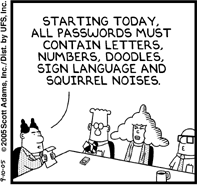 Image via WikipediaI'm stuck on a couple of writing projects at work, so I write this today as a mental gear-greasing exercise. Here's the TL;DR summary for the attention-deficient.
Image via WikipediaI'm stuck on a couple of writing projects at work, so I write this today as a mental gear-greasing exercise. Here's the TL;DR summary for the attention-deficient.All company rules exist because of a failure of management.
I'll explain what I mean by way of example. At a place I used to work, we published a lot of online content. During one of our regular rounds of "management has a new idea to change everything" there arose the notion of updating our massive backlog of old articles to make them relevant again. Not the worst idea ever, until it came to the execution.
Management insisted that -- site unseen -- 80% of old articles should be updated. This was entirely arbitrary. No one had any idea if even 10% of our backlog could be updated in a useful way. You had to slog through the backlog one piece at a time, see where updating made sense and then make the call. This was editorial, not accounting.
When I and a few of my colleagues asked why 80%, the head of editorial simply said, "If we don't give you a quota, some people just won't update anything."
This was a rule masquerading as management.
Rather than deal with whatever portion of employees didn't do their jobs, the head of editorial just threw out an arbitrary goal and held everyone -- good employees and bad -- to it. They'd either all fail or all succeed, but the manager wouldn't have to do anything so vulgar as actually managing anybody.
If you work for a large company, dig out that employee handbook you've never actually read (despite probably signing a document that swears you've really read it, which is itself a rule masquerading as management) and see how many rules are there just so managers don't have to manage their direct reports. How many of them could be replaced with competent one-on-one management?
- No more than 7 personal items on a desk?
- Specifying a maximum time for lunch breaks?
- Dictating which family members' deaths qualify for bereavement leave?
How many of these (and the dozens more like them) could be better settled by a manager simply informing an employee that his or her productivity isn't meeting expectations, or that his or her behavior is a workplace distraction? If the manager can't have that conversation effectively, the manager is the problem. If the manager has that conversation and the employee can't comply, the employee is the problem. The solution to both problems isn't another rule -- it's simply better management.
And don't play the "we need these policies to protect against lawsuits" card. If a manager is abusive, arguing that the abusive manager did or didn't violate company policy isn't a defense. If an employee meets criticism with litigation, citing the company handbook isn't going to save you any attorney's fees. Either the manager and/or the employee is an ass, and no printed booklet or signed receipt will stop an ass from being an ass.
More to the point, if you're hiring assholes, you need to hire better. Which, again, comes down to management.
Rules can't replace good management. People aren't data, and you can't optimize us with a legal algorithm. (In fact, drawing arbitrary lines makes us act worse, not better.) Hire the employees who already perform as you'd want and need them to and the employee handbook won't be necessary. Expecting the employee handbook to make subpar employees acceptable isn't just a recipe for failure -- it's the first sign of a failure in management.

Yeah!
ReplyDeleteThat is all.